外研版七年级上册Module 10 Spring Festival Unit 3 Language in use课件(共29张PPT)
文档属性
| 名称 | 外研版七年级上册Module 10 Spring Festival Unit 3 Language in use课件(共29张PPT) |
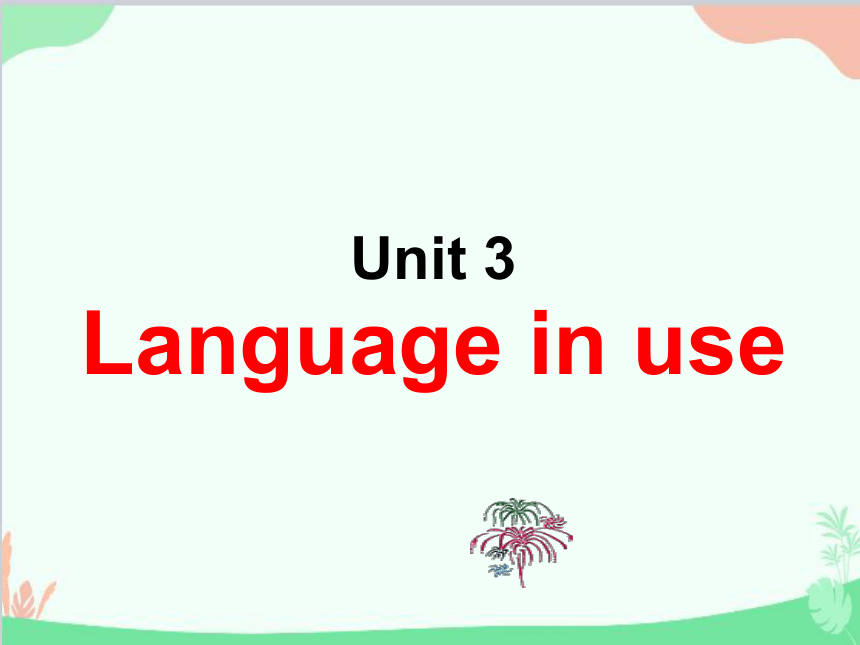
|
|
| 格式 | ppt | ||
| 文件大小 | 1.2MB | ||
| 资源类型 | 教案 | ||
| 版本资源 | 外研版 | ||
| 科目 | 英语 | ||
| 更新时间 | 2022-11-11 09:07:43 | ||
图片预览

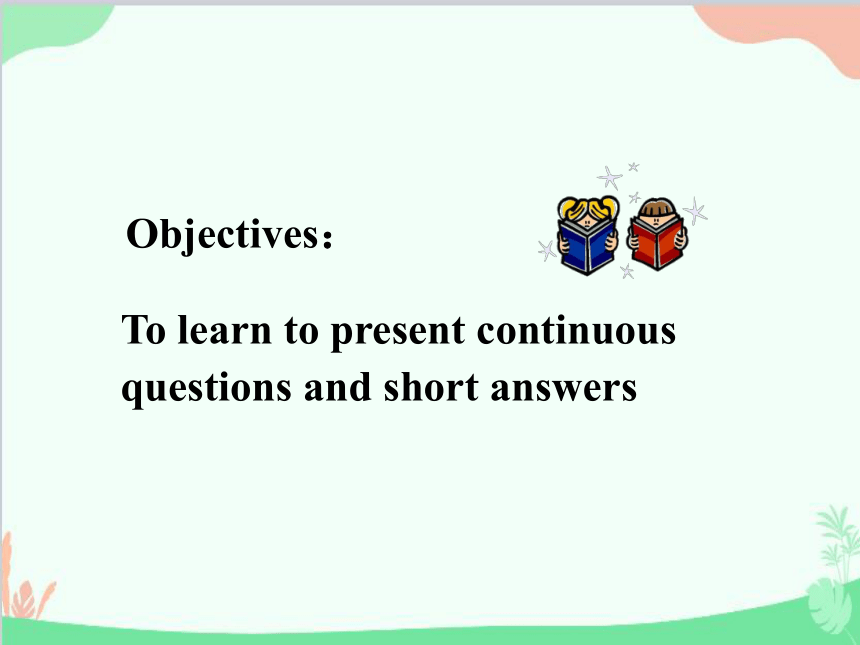
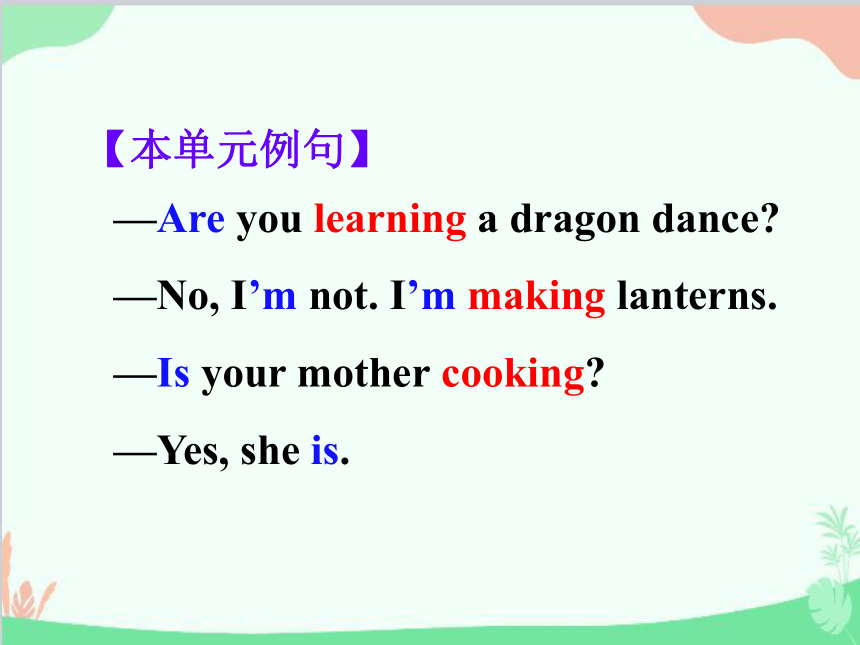
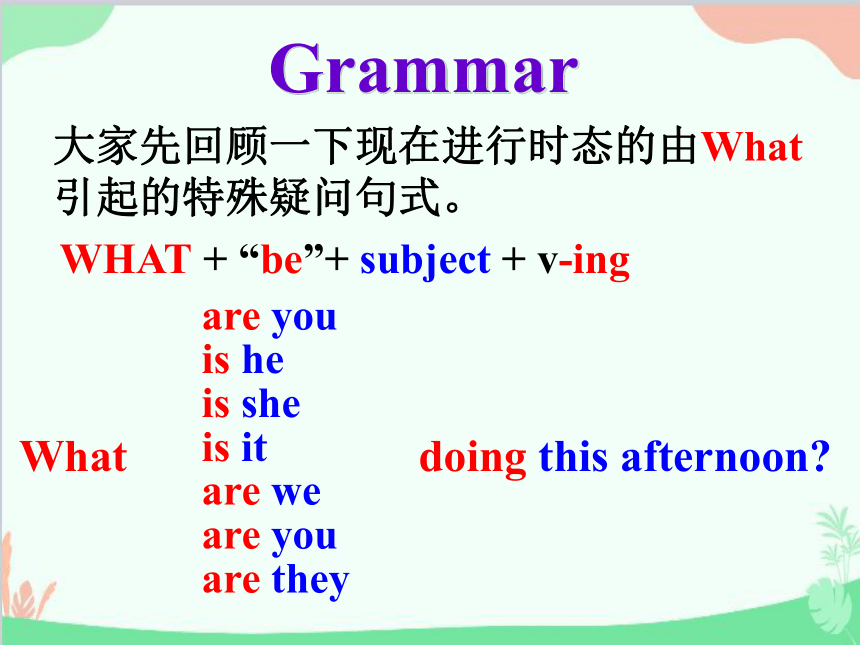
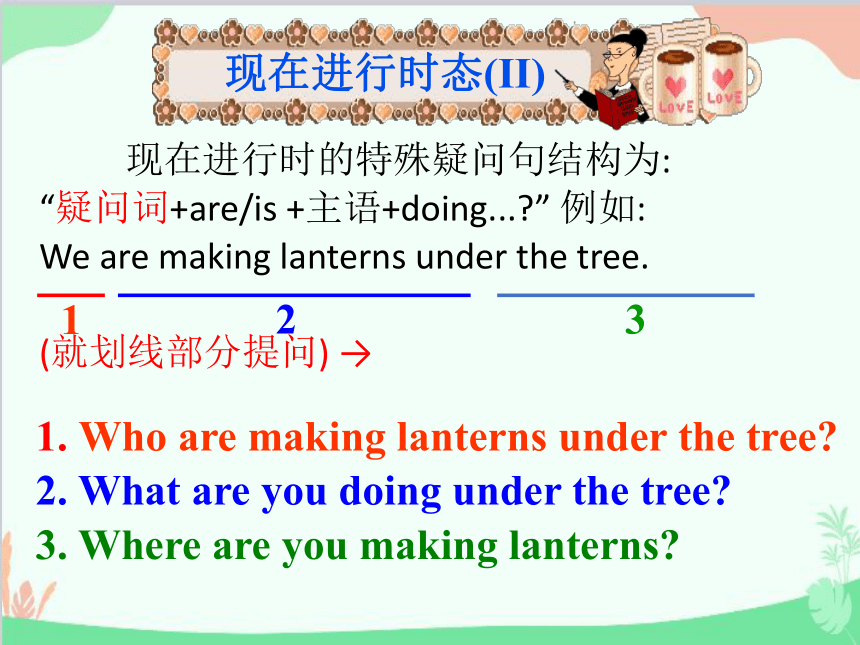
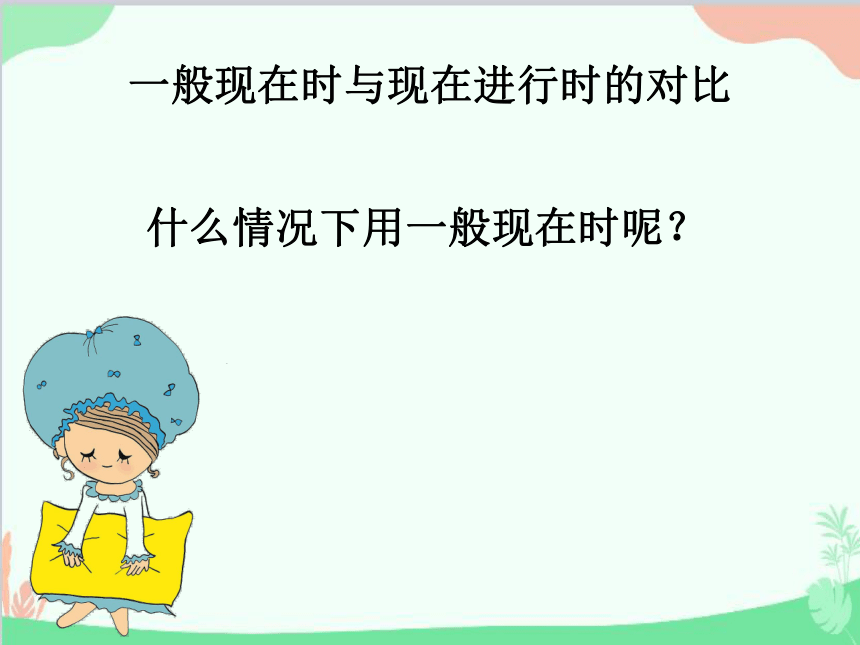
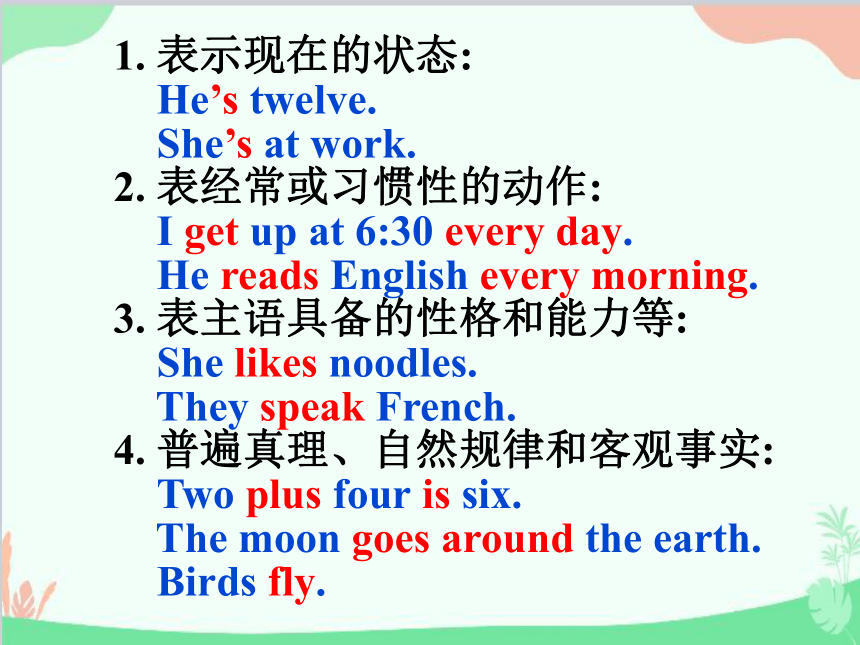
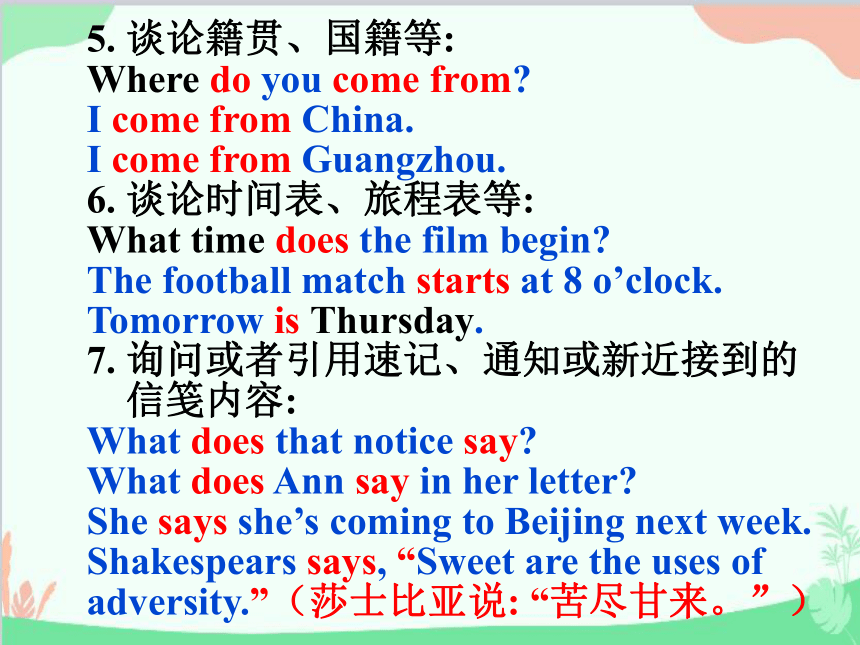
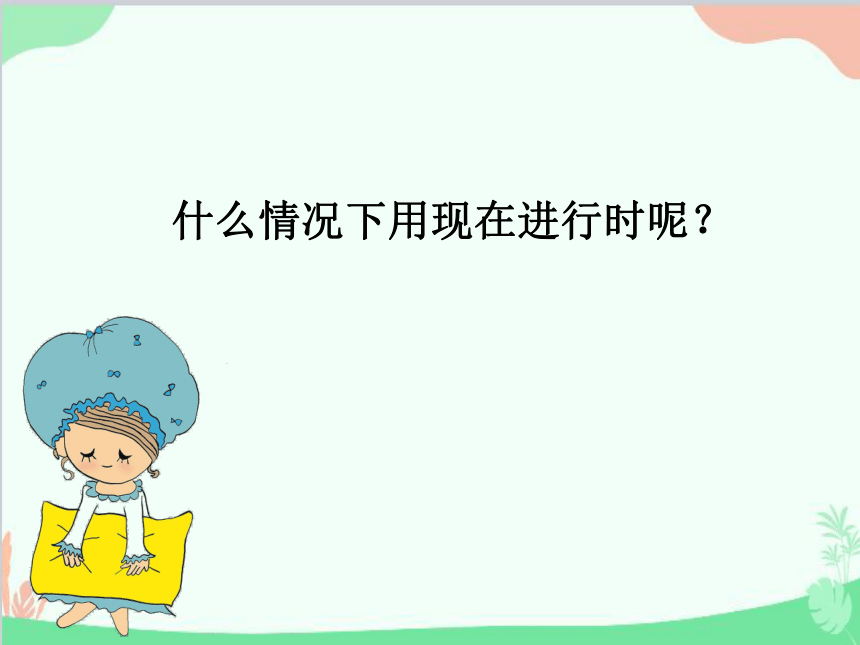
文档简介
(共29张PPT)
Unit 3
Language in use
To learn to present continuous questions and short answers
Objectives:
【本单元例句】
—Are you learning a dragon dance
—No, I’m not. I’m making lanterns.
—Is your mother cooking
—Yes, she is.
What
are you is he is she is it
are we are you are they
doing this afternoon
WHAT + “be”+ subject + v-ing
大家先回顾一下现在进行时态的由What引起的特殊疑问句式。
Grammar
现在进行时的特殊疑问句结构为:
“疑问词+are/is +主语+doing... ” 例如:
We are making lanterns under the tree.
(就划线部分提问) →
1
2
3
1. Who are making lanterns under the tree
2. What are you doing under the tree
3. Where are you making lanterns
现在进行时态(II)
一般现在时与现在进行时的对比
什么情况下用一般现在时呢?
1. 表示现在的状态:
He’s twelve.
She’s at work.
2. 表经常或习惯性的动作:
I get up at 6:30 every day.
He reads English every morning.
3. 表主语具备的性格和能力等:
She likes noodles.
They speak French.
4. 普遍真理、自然规律和客观事实:
Two plus four is six.
The moon goes around the earth.
Birds fly.
5. 谈论籍贯、国籍等:
Where do you come from
I come from China.
I come from Guangzhou.
6. 谈论时间表、旅程表等:
What time does the film begin
The football match starts at 8 o’clock.
Tomorrow is Thursday.
7. 询问或者引用速记、通知或新近接到的
信笺内容:
What does that notice say
What does Ann say in her letter
She says she’s coming to Beijing next week.
Shakespears says, “Sweet are the uses of adversity.”(莎士比亚说: “苦尽甘来。”)
什么情况下用现在进行时呢?
1. 表示说话时正在发生或者进行的动作。
2. 表示在现在相对较长一段时间内正在进 行的动作,但是说话那一刻不一定在做。
⊙难点区别:也许大家认为用一般现在时也可以, 但是要注意的是, 这些动作在说话时候不一定正在进行或发生,但说话的这一刹那包括在一段较长的时间内。)
He is building his own house.
David is teaching English and learning Chinese in Beijing.
We are preparing for Spring Festival.
I am writing a letter.
We are enjoying our trip.
一般现在时
(be动词是is, am, are), 行为动词是V原形+s/es
Are you a teacher
你是教师吗?
Yes, I am. / No, I’m not.
是的,我是。/不,我不是。
He plays football every day.
【构成不同】
对比两种时态,我们可以得出以下结论:
现在进行时由“助动词 be (am, is / are) + 动词-ing”
She is doing her homework now.
⊙现在进行时与always连用时, 往往含有赞扬厌恶责备等感彩。
He is always thinking of himself more
than others.
他总是考虑自己多于别人。
She is always changing her clothes.
她总是变化着她的衣着。
⊙表示的是某种状态的动词, 用一般现在时。一般不说 I am knowing, 而说 I know。
常见的这类动词有: want, like, hate, know, see, hear, believe, understand, seem, think, suppose, remember, need, love, realize, mean, forget, prefer, have, belong
⊙在there和here引起的句子中, 常用一般现在时代替现在进行时。
Here comes the bus.
There goes the bell.
常与一般现在时连用的时间状语有: always, often, usually, sometimes, usually, never, every day/week/month/year, on Sunday(s)/ Monday(s)/in the morning/afternoon/ evening, now, today every day, every week, on Sundays, three times a week…
【时间状语不同】
常与现在进行时连用的时间状语有: now, at the moment。另外, 以Look, Listen等开头的祈使句常常是现在进行时态的句子。
Listen! Who is singing over there
I write to my uncle every month.
Write questions and short answers.
Lingling / learning a dragon dance
→Is Lingling learning a Dragon Dance
No, she isn’t.
Lingling’s mother / cleaning the house
Is Lingling’s mother cleaning the house
Yes, she is.
2. Lingling’s father / making lanterns
Is Lingling’s father making lanterns
No, he isn’t.
Food
rice pudding
jiaozi
yuanxiao
Presents
new clothes
lucky money
watch fireworks
visit family and friends
watch dragon and lion dancing
put on new clothes
Traditions
Write a letter to a pen friend saying:
1 What you’re doing for the Spring
Festival at the moment.
2 What you usually do.
Use the notes you wrote in Activities 5 and 6.
Writing
Dear Lily,
Here in China it’s the Spring Festival and
we’re getting ready.
My mother is …
Usually we … and we…
Tell me about a festival in your country.
Best wishes,
Tom
称呼 (name)
署名(your name)
Affirmative Negative Interrogative
I am going I am not doing Am I doing
You are going You aren’t doing Are you doing
He, she, it is going He/she/it isn’t
doing Is he/she/it doing
We are going We aren’t doing Are we doing
You are going You aren’t doing Are you doing
They are going They aren’t doing Are they doing
Review
Exercise
Quiz
一、用动词的适当形式填空。
1. She _____ (go) to school every day. It’s ten o’clock in the morning. They are _____ supper. (eat)
2. He usually ____ up at 17:00. (get)
3. She ____ (live) in Beijing.
4. They are _______ (dig) a hole (洞).
5. My father __________ (mend) his model (模型) plane these days.
goes
having
gets
lives
digging
is mending
二、根据汉语提示完成句子。
1. 学生们正在为学校音乐节做准备。
The students are ______ _____ ___
the school music festival.
2. love在汉语中是什么意思?
_____ does love _____ in Chinese
3. 除了吉姆大家都在这儿。
________ __ ___ except Jim.
getting ready for
What mean
Everyone is here
三、翻译句子。
1. My mother isn’t at work.
___________________________
2. Do you know what I mean
____________________________
3. Sometimes Li Yun helps me clean
the classroom.
____________________________
4. Please bring me your report card
(成绩单)。
____________________________
5. What do you use a computer to do
____________________________
我妈妈现在不工作。
你明白我的意思吗?
有时李云帮我打扫教室。
把你的成绩单拿给我看。
你通常用电脑做什么?
四、根据句意选择词组完成下面句子。
have a look at a kind of on the same day
a few days clean our house sweep away
1. On my school trip, I’ve got some photos of it, do you want to ____________ them
2. Before Spring Festival, my family usually ______________ and __________ bad luck.
3. Jiaozi is delicious. It’s _________ dumpling.
4. They have cleaned the building for _______.
5. My birthday and Linda’s are ____________.
have a look at
clean our house sweep away
a kind of
a few days
on the same day
五、根据汉语提示, 完成句子, 每空一词。
1. 在元宵节,我们通常吃元宵。
On Lantern _______, we usually ____ yuanxiao.
2. 贝蒂正在学习舞龙。
Betty is _______ a dragon _____.
3. 玲玲一家正在为春节做准备。
Lingling’s ______ are ______ _____ __
Spring Festival
Festival
eat
learning
dance
family
getting ready for
4. 在除夕我们一起庆祝春节。
__ the evening ______ Spring Festival, we ________ Spring Festival together.
5. 他们正在唱圣诞歌。
They are _______ Christmas songs.
6. 大明和我正在玩电脑游戏。
Daming and I are ______ the computer games.
7. 元宵是一种美味的食物。
Yuanxiao is a ____ __ _______ food.
8. 她们正在做灯笼。
They are _______ _______.
On before
celebrate
singing
playing
kind of delicious
making lanterns
1. To preview the module 3-unit 1;
2. To practise the vocabulary.
Preview
Homework
Try to remember some of the things that people do at festivals.
Thank you!
谢谢大家!
Unit 3
Language in use
To learn to present continuous questions and short answers
Objectives:
【本单元例句】
—Are you learning a dragon dance
—No, I’m not. I’m making lanterns.
—Is your mother cooking
—Yes, she is.
What
are you is he is she is it
are we are you are they
doing this afternoon
WHAT + “be”+ subject + v-ing
大家先回顾一下现在进行时态的由What引起的特殊疑问句式。
Grammar
现在进行时的特殊疑问句结构为:
“疑问词+are/is +主语+doing... ” 例如:
We are making lanterns under the tree.
(就划线部分提问) →
1
2
3
1. Who are making lanterns under the tree
2. What are you doing under the tree
3. Where are you making lanterns
现在进行时态(II)
一般现在时与现在进行时的对比
什么情况下用一般现在时呢?
1. 表示现在的状态:
He’s twelve.
She’s at work.
2. 表经常或习惯性的动作:
I get up at 6:30 every day.
He reads English every morning.
3. 表主语具备的性格和能力等:
She likes noodles.
They speak French.
4. 普遍真理、自然规律和客观事实:
Two plus four is six.
The moon goes around the earth.
Birds fly.
5. 谈论籍贯、国籍等:
Where do you come from
I come from China.
I come from Guangzhou.
6. 谈论时间表、旅程表等:
What time does the film begin
The football match starts at 8 o’clock.
Tomorrow is Thursday.
7. 询问或者引用速记、通知或新近接到的
信笺内容:
What does that notice say
What does Ann say in her letter
She says she’s coming to Beijing next week.
Shakespears says, “Sweet are the uses of adversity.”(莎士比亚说: “苦尽甘来。”)
什么情况下用现在进行时呢?
1. 表示说话时正在发生或者进行的动作。
2. 表示在现在相对较长一段时间内正在进 行的动作,但是说话那一刻不一定在做。
⊙难点区别:也许大家认为用一般现在时也可以, 但是要注意的是, 这些动作在说话时候不一定正在进行或发生,但说话的这一刹那包括在一段较长的时间内。)
He is building his own house.
David is teaching English and learning Chinese in Beijing.
We are preparing for Spring Festival.
I am writing a letter.
We are enjoying our trip.
一般现在时
(be动词是is, am, are), 行为动词是V原形+s/es
Are you a teacher
你是教师吗?
Yes, I am. / No, I’m not.
是的,我是。/不,我不是。
He plays football every day.
【构成不同】
对比两种时态,我们可以得出以下结论:
现在进行时由“助动词 be (am, is / are) + 动词-ing”
She is doing her homework now.
⊙现在进行时与always连用时, 往往含有赞扬厌恶责备等感彩。
He is always thinking of himself more
than others.
他总是考虑自己多于别人。
She is always changing her clothes.
她总是变化着她的衣着。
⊙表示的是某种状态的动词, 用一般现在时。一般不说 I am knowing, 而说 I know。
常见的这类动词有: want, like, hate, know, see, hear, believe, understand, seem, think, suppose, remember, need, love, realize, mean, forget, prefer, have, belong
⊙在there和here引起的句子中, 常用一般现在时代替现在进行时。
Here comes the bus.
There goes the bell.
常与一般现在时连用的时间状语有: always, often, usually, sometimes, usually, never, every day/week/month/year, on Sunday(s)/ Monday(s)/in the morning/afternoon/ evening, now, today every day, every week, on Sundays, three times a week…
【时间状语不同】
常与现在进行时连用的时间状语有: now, at the moment。另外, 以Look, Listen等开头的祈使句常常是现在进行时态的句子。
Listen! Who is singing over there
I write to my uncle every month.
Write questions and short answers.
Lingling / learning a dragon dance
→Is Lingling learning a Dragon Dance
No, she isn’t.
Lingling’s mother / cleaning the house
Is Lingling’s mother cleaning the house
Yes, she is.
2. Lingling’s father / making lanterns
Is Lingling’s father making lanterns
No, he isn’t.
Food
rice pudding
jiaozi
yuanxiao
Presents
new clothes
lucky money
watch fireworks
visit family and friends
watch dragon and lion dancing
put on new clothes
Traditions
Write a letter to a pen friend saying:
1 What you’re doing for the Spring
Festival at the moment.
2 What you usually do.
Use the notes you wrote in Activities 5 and 6.
Writing
Dear Lily,
Here in China it’s the Spring Festival and
we’re getting ready.
My mother is …
Usually we … and we…
Tell me about a festival in your country.
Best wishes,
Tom
称呼 (name)
署名(your name)
Affirmative Negative Interrogative
I am going I am not doing Am I doing
You are going You aren’t doing Are you doing
He, she, it is going He/she/it isn’t
doing Is he/she/it doing
We are going We aren’t doing Are we doing
You are going You aren’t doing Are you doing
They are going They aren’t doing Are they doing
Review
Exercise
Quiz
一、用动词的适当形式填空。
1. She _____ (go) to school every day. It’s ten o’clock in the morning. They are _____ supper. (eat)
2. He usually ____ up at 17:00. (get)
3. She ____ (live) in Beijing.
4. They are _______ (dig) a hole (洞).
5. My father __________ (mend) his model (模型) plane these days.
goes
having
gets
lives
digging
is mending
二、根据汉语提示完成句子。
1. 学生们正在为学校音乐节做准备。
The students are ______ _____ ___
the school music festival.
2. love在汉语中是什么意思?
_____ does love _____ in Chinese
3. 除了吉姆大家都在这儿。
________ __ ___ except Jim.
getting ready for
What mean
Everyone is here
三、翻译句子。
1. My mother isn’t at work.
___________________________
2. Do you know what I mean
____________________________
3. Sometimes Li Yun helps me clean
the classroom.
____________________________
4. Please bring me your report card
(成绩单)。
____________________________
5. What do you use a computer to do
____________________________
我妈妈现在不工作。
你明白我的意思吗?
有时李云帮我打扫教室。
把你的成绩单拿给我看。
你通常用电脑做什么?
四、根据句意选择词组完成下面句子。
have a look at a kind of on the same day
a few days clean our house sweep away
1. On my school trip, I’ve got some photos of it, do you want to ____________ them
2. Before Spring Festival, my family usually ______________ and __________ bad luck.
3. Jiaozi is delicious. It’s _________ dumpling.
4. They have cleaned the building for _______.
5. My birthday and Linda’s are ____________.
have a look at
clean our house sweep away
a kind of
a few days
on the same day
五、根据汉语提示, 完成句子, 每空一词。
1. 在元宵节,我们通常吃元宵。
On Lantern _______, we usually ____ yuanxiao.
2. 贝蒂正在学习舞龙。
Betty is _______ a dragon _____.
3. 玲玲一家正在为春节做准备。
Lingling’s ______ are ______ _____ __
Spring Festival
Festival
eat
learning
dance
family
getting ready for
4. 在除夕我们一起庆祝春节。
__ the evening ______ Spring Festival, we ________ Spring Festival together.
5. 他们正在唱圣诞歌。
They are _______ Christmas songs.
6. 大明和我正在玩电脑游戏。
Daming and I are ______ the computer games.
7. 元宵是一种美味的食物。
Yuanxiao is a ____ __ _______ food.
8. 她们正在做灯笼。
They are _______ _______.
On before
celebrate
singing
playing
kind of delicious
making lanterns
1. To preview the module 3-unit 1;
2. To practise the vocabulary.
Preview
Homework
Try to remember some of the things that people do at festivals.
Thank you!
谢谢大家!
同课章节目录
- Starte
- Module 1 My teacher and my friends
- Module 2 My English lesson
- Module 3 My English book
- Module 4 My everyday life
- Module 1 My classmates
- Unit 1 Nice to meet you.
- Unit 2 I'm Wang Lingling and I'm thirteen years ol
- Unit 3 Language in use.
- Module 2 My family
- Unit 1 Is this your mum?
- Unit 2 These are my parents.
- Unit 3 Language in use.
- Module 3 My school
- Unit 1 There are thirty students in my class.
- Unit 2 The library is on the left of the playgroun
- Unit 3 Language in use.
- Module 4 Healthy food
- Unit 1 We've got lots of apples.
- Unit 2 Is your food and drink healthy?
- Unit 3 Language in use.
- Module 5 My school day
- Unit 1 I love history.
- Unit 2 We start work at nine o'clock.
- Unit 3 Language in use.
- Revision module A
- Module 6 A trip to the zoo
- Unit 1 Does it eat meat?
- Unit 2 The tiger lives in Asia.
- Unit 3 Language in use.
- Module 7 Computers
- Unit 1 How do I write my homework on the computer?
- Unit 2 When do you use a computer?
- Unit 3 Language in use.
- Module 8 Choosing presents
- Unit 1 I always like birthday parties.
- Unit 2 She often goes to concerts.
- Unit 3 Language in use.
- Module 9 People and places
- Unit 1 We're enjoying the school trip a lot.
- Unit 2 They're waiting for buses or trains.
- Unit 3 Language in use.
- Module 10 Spring Festival
- Unit 1 Are you getting ready for Spring Festival?
- Unit 2 My mother's cleaning our houses and sweepin
- Unit 3 Language in use.
- Revision module B
